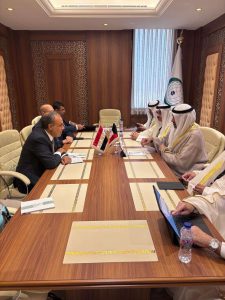Saleh Al-Meftah, Deputy Director of the Scholarship Department at the Ministry of Education and Higher Education, confirmed that the government scholarship program focuses on increasing the number of students studying abroad in fields that support the knowledge economy and improve Qatar’s higher education indicators. The scholarship program includes three main tracks: the Emir Scholarship Program, the External Scholarship Program, and the Internal Scholarship Program (including the Ambition program), aiming to meet the educational needs of Qatari students at various academic levels and broaden their future prospects through diverse specializations inside and outside the country. The new scholarship policy is based on four main principles: quality, diversity, excellence, and commitment, linking the pillars of the national vision and the ministry’s strategic goals, including economic diversification, equal opportunities, inclusiveness, and talent development according to students’ inclinations and abilities.
The external scholarship program offers distinguished academic opportunities at global universities ranked among the top 200 worldwide by specialization, including sciences, technology, education, sports, arts, and humanities. Admission is competitive, prioritizing students with high grades and acceptance at top-ranked universities. Admission requirements include a minimum of 80% for bachelor’s degrees and 70% for diploma programs, passing English language requirements, and unconditional final acceptance from an accredited university. The program expanded from three to eight educational tracks to meet labor market needs and student interests: graduate studies, education and educational sciences, healthcare and medical sciences, science, engineering and technology, social and human sciences, sports, diploma programs, and creative economy. The scholarship program selects universities based on strict global standards to measure education quality and outcomes. Many scholarship graduates now hold leadership positions in state institutions. Studying abroad provides important life skills such as communication with different cultures, language acquisition, and self-reliance.
Popular specializations among students include medicine, computer science, and engineering, with a noticeable shift this year towards economics and entrepreneurship, as well as new fields like criminology and aviation management, indicating a positive diversification of academic interests. The cultural attachés in Qatari embassies abroad play a significant role in supporting scholarship students and overcoming obstacles to ensure their successful and distinguished studies. Al-Meftah concluded by inviting interested students to register through the scholarship portal, emphasizing the importance of carefully reading the conditions, specializations, and available universities and accurately entering their data to ensure easy communication.














Recommended for you
Talib Al-Rifai Chronicles Kuwaiti Art Heritage in "Doukhi.. Tasaseem Al-Saba"
Exhibition City Completes About 80% of Preparations for the Damascus International Fair Launch
Unified Admission Applications Start Tuesday with 640 Students to be Accepted in Medicine
Egypt Post: We Have Over 10 Million Customers in Savings Accounts and Offer Daily, Monthly, and Annual Returns
His Highness Sheikh Isa bin Salman bin Hamad Al Khalifa Receives the United States Ambassador to the Kingdom of Bahrain
Al-Jaghbeer: The Industrial Sector Leads Economic Growth